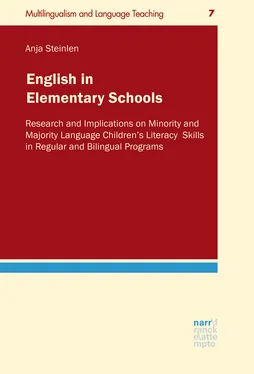can understand very short, simple texts a single phrase at a time, can pick up familiar names, words and basic phrases and can reread as required (Council of Europe, 2001: 68),
can recognize familiar names, words and very basic phrases on simple notices in the most common everyday situations (ibid.: 70),
can write a short simple postcard (ibid.: 83), and
can copy familiar words and short phrases e.g., simple signs or instructions, names of everyday objects, names of shops and set phrases used regularly (ibid.: 84).
The situation of elementary school English in the three Federal States of Baden-Württemberg, Schleswig-Holstein and Berlin-Brandenburg, where the elementary schools in the present studies are located, may be characterized as follows: In Baden-Württemberg, English-as-a-subject was offered from grade 1 onwards (until 2019). According to the curriculum (2004) for English (which is relevant for the collection of data for the present study), reading and writing activities did not start before grade 31, with the focus on oral skills in the first two grades; and competence levels were not specified (Ministerium Baden-Württemberg für Kultus, Jugend und Sport, 2004). From 2016 to 2019, English reading and writing activities were also included in grade 1 and 2; and level A1 was to be attaineded at the end of grade 4 (Ministerium Baden-Württemberg für Kultus, Jugend und Sport, 2016a). Since 2019, elementary schools in Baden-Württemberg offer English-as-a-subject only in grades 3 and 4 (Ministerium Baden-Württemberg für Kultus, Jugend und Sport, 2020). In Schleswig-Holstein, English-as-a-subject is introduced in grade 3, and reading and writing are subordinate to listening and speaking2; level A1 is expected at the end of grade 4 (Ministerium für Bildung, Wissenschaft, Forschung und Kultur des Landes Schleswig-Holstein, 2007). Finally, English-as-a-subject is introduced in grade 3 in Berlin-Brandenburg. FL competence levels are not specified for elementary schools but level A2 should be attained in grade 8 (Senatsverwaltung Berlin für Bildung, Jugend und Sport, 2006). Depending on their level, students in Berlin at the end of grade 4 can read, copy and write very short English words or texts that they are familiar with, similar to level A1.
The use of literacy activities in the elementary school FL classroom has been examined by Hempel (2016). Based on interviews with almost 150 English elementary school teachers in Germany, she found that 98% of these teachers used a textbook, usually Playway, Ginger, or Bumblebee . An analysis of these textbooks revealed that the activities in these books are mainly geared towards speaking (55%) and listening (26%); reading and writing activities are rather underrepresented (1% and 9%). This parallels the role of literacy activities in the different curricula of the Federal States of Germany for the subject English, in which reading and particularly writing still play only a minor role.
In her analysis of English textbooks for elementary schools, Burwitz-Melzer (2010: 110) pointed out that textbooks nowadays include a greater number of tasked-based reading and writing activities than older versions. However, in her view, textbooks still do not sufficiently explain how to teach reading and writing; and they neither offer any literacy methodology based on any learning theory, nor any systematic strategies for reading and writing, which may support teaching and learning. Although certain levels of competence should be reached at the end of grade 4 (namely A1), textbooks do not provide sufficient guidelines as to how this goal could be reached, particularly with respect to the heterogeneous FL level in class. According to Burwitz-Melzer (2010) there is still considerable room for improvement regarding literacy instruction in English textbooks and in the respective guidelines for teachers of English as a subject.
2.2.4 Studies on FL reading in regular EFL programs
In empirical research, an increasing number of studies have examined the influence of written language on foreign language learning in elementary schools in Germany, but the focus has been more on reading (comprehension) than on writing. These studies have been largely conducted in only one Federal State of Germany (e.g., EVENING for Nordrhine-Westfalia, or Rymarczyk, 2011; Steinlen & Piske, 2018 for Baden-Württemberg), with the exception of the BIG-Kreis (2015), which assessed students’ FL competence in different Federal States. Unfortunately, many findings were not related to the Common European Framework of Reference (CEFR, Council of Europe, 2001, 2018) and/or statistically analysed.
The EVENING study (Evaluation Englisch in der Grundschule) was conducted with around 1,300 fourth grade classes in Nordrhine-Westfalia (NRW, Engel, Groot-Wilken & Thürmann, 2009), who had attended regular FL lessons since the beginning of grade 3. The reading test consisted of 25 multiple-choice and matching tasks, which were specifically designed for the project, and assessed reading skills with regard to the children’s world knowledge, lexical knowledge and knowledge of chunks and phrasal verbs. In total, the children solved 66.8% of all tasks. These results were better than expected, because English in its written form had only played a subordinate role in the curriculum in NRW at that time (2005-2007). This was also reflected in the low amount of reading activities carried out in the 88 hours of EFL lessons (Wilden et al., 2013).
Elementary schoolers’ English skills in reading, writing, listening, and speaking were evaluated in the BIG-study with a sample of 2,148 fourth grade students from different Federal States of Germany (BIG-Kreis, 2015), using test material from the EVENING study. The 17 items on English reading comprehension included multiple choice tasks and tasks on reordering sentences to match pictures. On average, students answered 14 items correctly, corresponding to 82.4%. However, the authors pointed out that the tasks may have been too easy, because the fourth graders in the BIG-study obtained scores on the reading comprehension tasks that were more than 15% higher than those scores reported in the EVENING study (Engel et al., 2009).
Smaller-scale studies on English reading skills in regular English classrooms in Germany include Rymarczyk (2011) and Steinlen & Piske (2018a). Rymarczyk (2011) examined English reading comprehension skills of 48 first- and third-graders in the FL classroom, reporting that even weaker learners, when confronted with English writing in the classroom, showed significant learning gains in reading. Due to the incongruent phoneme-grapheme relationship in English, the children in Rymarczyk’s study achieved better results on the silent-reading, word-picture matching task than on the reading-aloud task. Based on these results, Rymarczyk (2011) argued for the inclusion of written language in the first two elementary school years, as doing so may also present additional learning opportunities for weaker students (see also Wilden et al., 2013 and chapter 7.1).
Steinlen & Piske (2018a) examined English reading comprehension skills of 73 students at the end of grade 4 who had attended a FL program since first grade. Using the subtests for reading from the Primary School Assessment Kit (PSAK, Little, Simpson & Catibusic, 2003), they found these children to perform in-between levels A1 and A2 regarding their English reading comprehension skills. Thus, the outcome for English reading exceeded the target level of A1 (KMK, 2013a). The authors argued that these results were possibly due to two factors. Apart from the children’s background (i.e., having age-appropriate cognitive abilities and coming from middle-class families), the high quality of the English lessons in the FL program may have been the decisive factor, since the teachers in the FL program hold university degrees in teaching English-as-a-subject rather than teaching “fachfremd” (i.e., without any qualification for this subject which may negatively affect students’ performance, see also Fleckenstein et al., 2020).
Читать дальше












